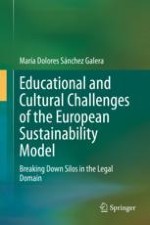2020 | OriginalPaper | Buchkapitel
3. The European Sustainability Model: From the Global Governance Scenario to the European Picture ‘Integrating’ Intergenerational Justice and Accessible Governance Mechanisms
verfasst von : María Dolores Sánchez Galera
Erschienen in: Educational and Cultural Challenges of the European Sustainability Model
Aktivieren Sie unsere intelligente Suche, um passende Fachinhalte oder Patente zu finden.
Wählen Sie Textabschnitte aus um mit Künstlicher Intelligenz passenden Patente zu finden. powered by
Markieren Sie Textabschnitte, um KI-gestützt weitere passende Inhalte zu finden. powered by
